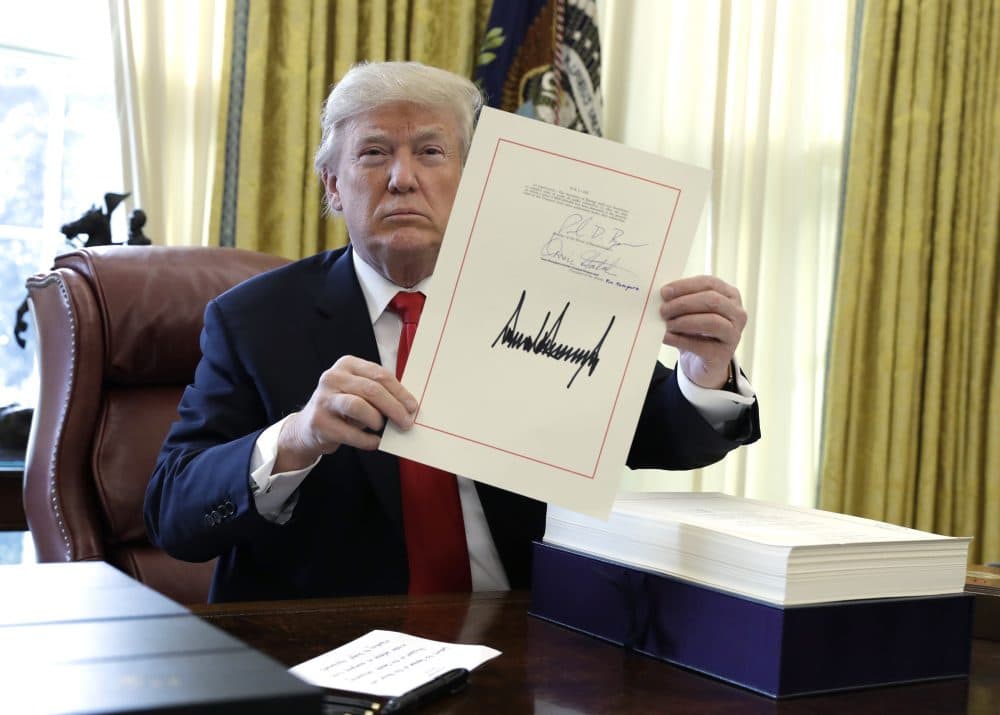Advertisement
Trump Said Tax Cuts Would Be 'Rocket Fuel' For The Economy. Analysis Shows They Haven't
Resume
When President Trump signed the Tax Cuts and Jobs Act into law in December 2017, he hailed it as a major legislative victory — calling the cuts "rocket fuel" for the U.S. economy and claiming they would pay for themselves.
But according to an analysis released earlier this month by the nonpartisan Congressional Research Service, the $1.5 trillion tax package has had a minimal economic impact.
"It's no surprise," says Howard Gleckman, senior fellow at the Urban-Brookings Tax Policy Center, adding independent analysis by other groups arrived at the same conclusion more than a year ago. "Nearly everyone who looked at this, other than the Trump administration itself, felt that this would have very little effect on the economy."
Trump praised the measure as "a bill for the middle class and a bill for jobs." The administration put a number on what it would mean for workers, saying the average American family would benefit to the tune of between $4,000 and $9,000 a year thanks to a slashed corporate tax rate. Gleckman (@howard_gleckman) says companies took that benefit and handed it primarily to their shareholders, not their employees.
"Corporate investment did bump up a little bit, but not very much. Companies didn't give employees raises, not right away," he tells Here & Now's Jeremy Hobson. "So what do the companies do with all that money? They bought back stock and they gave shareholders dividends. And essentially what that says is that the companies couldn't think of anything productive to do with the money."
Interview Highlights
On the bill's impact in the months after it was passed
"Normally, if you saw a big piece of legislation that affected the economy, you'd see an inflection point. You'd see something dramatically changing from the time before the law passed till the time after it passed. And that just didn't happen here. What we saw was for the first couple of quarters in the first half of 2018, there was a little bit of bump in investment. There was a little bit of a bump in GDP. But the investment bump disappeared. Wage growth never really happened — there was some small increase in wages, but again, it was pretty much the same as it was before the law passed. So we just didn't see much that you could tie to the Tax Cuts and Jobs Act."
"Normally, if you saw a big piece of legislation that affected the economy, you'd see an inflection point. You'd see something dramatically changing from the time before the law passed till the time after it passed. And that just didn't happen here."
Howard Gleckman
On the Trump administration's claim the tax cuts would pay for themselves
"Most of the independent analysts thought that this would lose a lot of revenue. It did. The Congressional Research Service estimate was that it lost about $170 billion in 2018 — which is pretty consistent, again, with what most people figured. The argument that this was going to pay for itself was never a serious argument. It was a political claim. No real economist ever thought that was going to happen, and in fact it didn't."
On what this lack of impact could mean for the future — and for the 2020 presidential race
"Well it's interesting, because ... in the [2018 midterms] campaign, Republicans never really got very much traction talking about this tax cut. Democrats talked about it more than Republicans, and they talked about it as a tax cut for the rich and for corporations, and this study confirms that it was in fact a tax cut for corporations. The argument is that, we remember the old James Carville line, 'It's the economy stupid.' But the question is, are people going to tie a strong economy — assuming it is still strong in a year, in an election season — are they going to tie that strong economy to this law? And frankly I think it's going to be very difficult to do. I think people's memory of this legislation will have faded. It'll be three years from the time the bill passed till the time that people vote for president again, and it's hard to find any effects.
"The other thing that's important to note is that this tax cut didn't occur in a vacuum. There's a lot of other things going on in the economy — some good, some bad. So one of the things that happened in 2018 was Congress passed a big spending bill. So that added some stimulus to the economy, and that could have amplified the benefits of this tax bill. But the other thing that happened was the president imposed very strict tariffs, on not only China but many of our other trading partners. We might have seen more of an effect. But because the president followed up this big tax cut with tariffs — which are in fact a big tax increase — much of the benefit of the Tax Cuts and Jobs Act was washed away."
Julia Corcoran produced this interview and edited it for broadcast with Todd Mundt. Jack Mitchell adapted it for the web.
This segment aired on May 31, 2019.
